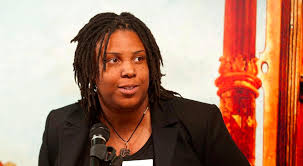Narrative Changer
Dr. Torie Weiston-Serdan
Founder and Executive Director
Youth Mentoring Action Network
 @Tweiston
@Tweiston
Bio of a Narrative Changer: Torie is a scholar and practitioner with over eleven years of teaching and youth programming experience. She received her Ph.D. in Education from Claremont Graduate University, and currently teaches high school English in Southern California. She is interested in exploring and addressing gaps in the areas of mentoring and education through research, policy and programming efforts. She writes a blog (criticalperspective.org) where she shares her work and the work of other mentoring and education experts who approach these issues with a keen and critical eye. Torie founded the Youth Mentoring Action Network, a non-profit organization that focuses on mentoring suburban youth of color. The organization has served over 500 youth, helping them get to universities like the University of California at Berkeley, American University, Howard University, Clark Atlanta University, and California State East Bay. An expert in youth mentoring, she specializes in training mentors to work with diverse youth populations, i.e. Black, Latino, LGBTQQ, First Generation College Students and Low-Income youth.
Her motto is: "Young people would do amazing things if adults just got out of the way."
Q: How is Your Work Changing The Narrative: When I founded the Youth Mentoring Action Network, the goal was to work with young people that very few people wanted to work with in ways that very few people wanted to. That carefully cultivated work has become critical mentoring, a concept shaped by the needs my protégés have shared as we travel the mentoring path together. Critical mentoring seeks to move mentoring research and praxis into a larger discourse around the critical examination of race, ethnicity, class, gender and sexuality as they pertain to mentoring. Critical mentoring challenges deficit-based notions of protégés, limited metrics that ignore meta-narratives and protégé adaptation to dominant ideologies. Furthermore, critical mentoring seeks to engage both the mentor and the protégé in processes that trigger critical consciousness and an ongoing and joint struggle for transformation. Engaging mentoring researchers, practitioners and community organizations in conversations that challenge the way in which they currently “do” mentoring is daunting, but I continue to push the boundaries of mentoring because young people deserve better than scripted and tokenized programs, they deserve truth, authenticity and change. If we are to leverage mentoring relationships to support our young people, they better be real and they better be relevant.
Her motto is: "Young people would do amazing things if adults just got out of the way."
Q: How is Your Work Changing The Narrative: When I founded the Youth Mentoring Action Network, the goal was to work with young people that very few people wanted to work with in ways that very few people wanted to. That carefully cultivated work has become critical mentoring, a concept shaped by the needs my protégés have shared as we travel the mentoring path together. Critical mentoring seeks to move mentoring research and praxis into a larger discourse around the critical examination of race, ethnicity, class, gender and sexuality as they pertain to mentoring. Critical mentoring challenges deficit-based notions of protégés, limited metrics that ignore meta-narratives and protégé adaptation to dominant ideologies. Furthermore, critical mentoring seeks to engage both the mentor and the protégé in processes that trigger critical consciousness and an ongoing and joint struggle for transformation. Engaging mentoring researchers, practitioners and community organizations in conversations that challenge the way in which they currently “do” mentoring is daunting, but I continue to push the boundaries of mentoring because young people deserve better than scripted and tokenized programs, they deserve truth, authenticity and change. If we are to leverage mentoring relationships to support our young people, they better be real and they better be relevant.